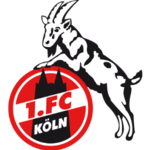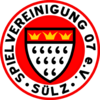1. FC Köln
 |
|||
| Full name | 1. Fußball Club Köln | ||
|---|---|---|---|
| Nickname(s) | Die Geißböcke (The Billy Goats), FC |
||
| Founded | 13 February 1948 | ||
| Ground | RheinEnergieStadion, Cologne (Capacity: 50,374) |
||
| President | |||
| Manager | |||
| Coach | |||
| League | Bundesliga | ||
| 2009–10 | Bundesliga, 13th | ||
|
|||
1. FC Köln is a German football club based in Cologne, North Rhine-Westphalia. It was formed in 1948 as a merger of the clubs Kölner Ballspiel-Club 1901 and SpVgg Sülz 07.
The club's nickname Die Geißböcke ("The Billy Goats") refers to the club's mascot, a male goat named Hennes after the veteran FC player and (later) manager Hennes Weisweiler. The first Hennes was donated by circus entrepreneur as a carnival joke. Currently (since July 24, 2008) the eighth Hennes is the acting mascot. Another nickname, more common locally due to its ambiguity, is FC, a common German abbreviation for football clubs. Characteristic for the dialect spoken around Cologne, this is pronounced "EF-tsay", in contrast to the high language pronunciation of the abbreviation where the stress is on the "C".
Like many of Germany's other professional football clubs, 1. FC Köln is part of a larger sports club that also incorporates departments playing other sports, in this case handball, table tennis and gymnastics. The club's main rivals are Borussia Mönchengladbach, Bayer Leverkusen, and Fortuna Düsseldorf – all clubs from the same general region, near the river Rhine.
Contents |
History
Predecessor sides

Kölner BC was formed on June 6, 1901 by a group of young men who were unhappy as part of the gymnastics club FC Borussia Köln and far more interested in football. BC was a competitive side in the Zehnerliga West in the years before World War I who took the Westdeutsche championship in 1912 and advanced to the preliminary rounds of the national finals. Their next best result was a losing appearance in the 1920 league final, where they lost a 1-3 to Borussia Mönchengladbach.

Spielvereinigung 1907 Köln-Sülz was established in 1907 as Sülzer Sportverein and on January 1, 1919 merged with Fußball Club 1908 Hertha Sülz to form SpVgg. They won the Westdeutscher title in 1928 and they too went out in the early rounds of the national finals in their turn on that stage. They went on to play as a top flight club in the Gauliga Mittelrhein, one of sixteen premier level divisions established in 1933 in the re-organization of German football under the Third Reich. The side earned generally good results through the 30s – including a divisional championship in 1939 – but then faltered in the early 40s. After the 1941 season the Gauliga Mittlerhein was split into two new divisions: the Gauliga Köln-Aachen and the Gauliga Moselland, which included clubs from occupied Luxembourg. Sülz struggled until they were united with VfL Köln 1899 for the 1943-44 season to form the combined wartime side Kriegspielgemeinschaft VfL 99/Sülz 07 which promptly won the Gauliga Köln-Aachen title by a single point over SG Düren 99 in a close race. The club did not play the next campaign as war overtook the region.
A successful new club
After the union of these two predecessor sides, 1. FC Köln began play in the tough Oberliga West in the 1949-50 season and by 1954 had won their first divisional championship. That same year they lost a 1-0 German Cup final to VfB Stuttgart. Die Geißböcke won their second divisional championship in 1960 and this time parlayed that title into an appearance in the national final against Hamburg, where they went down to a 2-3 defeat. They went on to finish first in the Oberliga West in each of the next three seasons and again played their way to the national final in 1962 and 1963. They won the '62 match 4-0 over Nuremberg, but dropped the following year's contest 1-3 to Borussia Dortmund. By virtue of their appearance in the 1963 final they were selected as one of the original sixteen teams to play in the Bundesliga, Germany's new professional football league. Köln continued their winning ways by becoming the first ever Bundesliga champion in the league's inaugural 1963-64 season. The most successful year for the club was 1978, where they won the national championship for the third time and also captured the national cup.
The most infamous result to fans was possibly a match played in the quarter-finals of the 1965 European Cup, where they met England's Liverpool F.C. After two 0-0 draws, a third game was played which was also a stalemate, this time 2-2. As the penalty shootout had not yet been introduced as the means of deciding a tie, Köln went out of the competition on the toss of a coin. Ironically enough there was the need for a second coin toss, because the first time the coin stuck vertically in the ground.
21st century: ups and downs
In recent years, the club's performance was mixed. The FC holds the doubtful distinction of the worst goal drought in Bundesliga history; in 2002, the supporters had to wait 1034 excruciating minutes (equivalent to eleven games and a half) until Thomas Cichon found the back of the net again [1].
In the early years of the Bundesliga, 1. FC Köln was the most successful club in West Germany in terms of total points won. However, beginning in the early 1990s the club's performance fell, and in 1998 they were relegated for the first time. Since about 2000, the side has been a "yo-yo team", moving between the first and second divisions. They returned to the Bundesliga at the end of the 2004-05 season as 2. Bundesliga champions after having been relegated the season before. There was little optimism about their return to the top flight as they were picked by German football magazine Kicker as one of the clubs most likely to be relegated.
This prediction came true when Köln lost to Hamburg 0-1 in the third to last match of the season. The club finished the season in second to last place and was relegated after conceding a league-worst 71 goals. The team's most prolific goalscorer was Lukas Podolski with a total of 12 goals, who transferred to Bayern Munich after the end of the season. He also appeared with the national side in the 2006 World Cup competition.
In late 2006, former coach Christoph Daum was convinced to once again take the helm of the 2. Bundesliga club and succeeded in leading the club back to the 1. Bundesliga in 2008. After a successful Bundesliga campaign in 2008–09 Daum left Köln towards his former club Fenerbahçe. Also Köln's former star-striker Lukas Podolski returned for the 2009–10 season.
Recent seasons
| Year | Division | Position |
| 1999-2000 | 2. Bundesliga (II) | 1st (promoted) |
| 2000-01 | Bundesliga (I) | 10th |
| 2001-02 | Bundesliga | 17th (relegated) |
| 2002-03 | 2. Bundesliga (II) | 2nd (promoted) |
| 2003-04 | Bundesliga (I) | 18th (relegated) |
| 2004-05 | 2. Bundesliga (II) | 1st (promoted) |
| 2005-06 | Bundesliga (I) | 17th (relegated) |
| 2006-07 | 2. Bundesliga (II) | 9th |
| 2007-08 | 2. Bundesliga | 3rd (promoted) |
| 2008-09 | Bundesliga (I) | 12th |
| 2009-10 | Bundesliga (I) | 13th |
Honours
- German champions 1962, 1964, 1978
- German champions runners-up: 1960, 1963, 1965, 1973, 1982, 1989, 1990
- German Cup winners: 1968, 1977, 1978, 1983
- German Cup runners-up: 1954, 1970, 1971, 1973, 1980, 1991
- UEFA Cup runners-up: 1986
- Uhrencup: 1991
- Joan Gamper Trophy of Barcelona: 1978, 1981
- Trofeo Villa de Gijón 1973
Reserve team
- German amateur champions: 1981
Youth
- German Under 19 championship
- Champions: 1971
- Runners-up: 1974, 1983, 1992
- German Under 17 championship
- Champions: 1990
- Under 19 Bundesliga West
- Champions: 2008
Stadium
The team plays its home matches in the RheinEnergie Stadion, with a capacity of little over 50,000. The name comes from a contract with the local power supplier RheinEnergy AG that will last till 2014. However, most fans still call the stadium "Müngersdorfer Stadion", according to the former stadium and the suburb Müngersdorf, where it is located.
Players
Current squad
For recent transfers, see List of German football transfers summer 2010 and List of German football transfers winter 2009–10.
Note: Flags indicate national team as has been defined under FIFA eligibility rules. Players may hold more than one non-FIFA nationality.
|
|
Players out on loan
Note: Flags indicate national team as has been defined under FIFA eligibility rules. Players may hold more than one non-FIFA nationality.
|
1. FC Köln II squad
As of 1 February 2010[update]
Manager: ![]() Frank Schäfer
Frank Schäfer
Note: Flags indicate national team as has been defined under FIFA eligibility rules. Players may hold more than one non-FIFA nationality.
|
|
Women's section
Since July 2009 the club has a women's football section as FFC Brauweiler Pulheim dissolved their club to join 1. FC Köln. The team is coached by Klaus Schmischke[1] and plays in the 2nd Bundesliga in 2009–10.[2] They play in the Franz-Kremer-Stadion.
Note: Flags indicate national team as has been defined under FIFA eligibility rules. Players may hold more than one non-FIFA nationality.
|
|
Notable chairmen
Franz Kremer |1948–1967
Werner Müller |1967–1968
Oskar Maass |1968–1973
Peter Weiand |1973–1987
Dietmar Artzinger-Bolten |1987–1991
Klaus Hartmann |1991–1997
Albert Caspers |1997–2004
Wolfgang Overath |2004-
References
- ↑ "Trainerteam" (in German). 1. FC Köln. 2009. Archived from the original on 2009-09-26. http://www.webcitation.org/5k5EljqjN. Retrieved 2009-09-24.
- ↑ "Letzte Hürde zur Fusion mit dem 1. FC Köln genommen" (in German). FFC Brauweiler Pulheim. 2009. Archived from the original on 2009-07-20. http://www.webcitation.org/5iQDHSZtv. Retrieved 2009-06-30.
- Grüne, Hardy (2001). Vereinslexikon. Kassel: AGON Sportverlag ISBN 3-89784-147-9
- Das deutsche Fußball-Archiv historical German domestic league tables (in German)
- eufo.de European football club profiles and current team rosters
External links
|
|||||
|
||||||||
|
|||||
|
||||||||
|
|||||
|
|||||